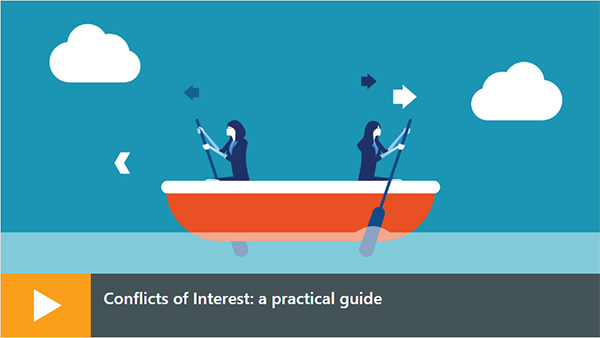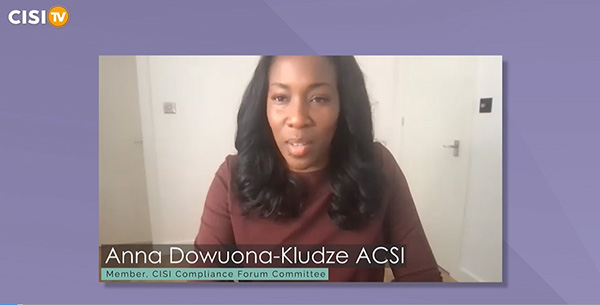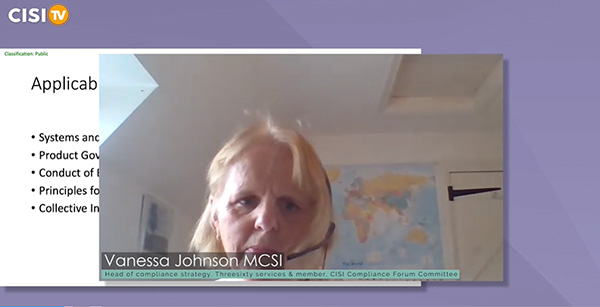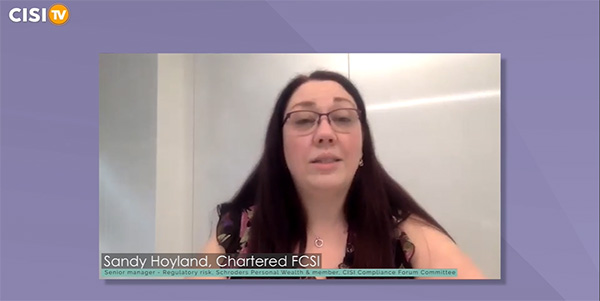Recent FCA penalties have highlighted the importance to firms of conflict-of-interest avoidance, management and disclosure, as discussed at a CISI Compliance Forum Committee event in February 2022
by Sophie Mackenzie
In March 2022, the FCA published a final notice announcing a fine of £9.1m imposed on asset manager GAM International Management for failing to manage conflicts of interest. Tim Haywood, a former investment director and business unit head at the firm, was fined an additional £230,037. The ruling highlights the increased importance of conflict-of-interest management, which had been covered in depth at a CISI webinar in February 2022: ‘Conflicts of interest: a practical guide’.
Three CISI Compliance Forum Committee members spoke at the event: Sandy Hoyland, Chartered FCSI, senior manager, regulatory risk, Schroders Personal Wealth; Vanessa Johnson MCSI, head of compliance strategy, Threesixty services; and Anna Dowuona-Kludze ACSI, head of regulatory compliance at Handelsbanken.
The below synopsis covers some of the key points mentioned but to gain the full value from the session and to earn an hour CPD, view the full webinar in MyCISI.

In her introductory remarks, Anna refers to the GAM case, noting that it and similar recent rulings have demonstrated the FCA’s increasing scrutiny of conflict-of-interest management.

“It’s really important that when people are thinking about conflicts of interest, you’re not just considering internal conflicts, but also potential external conflicts as well,” she says, going on to point out that while it can be easy to think a conflict of interest exists when in reality it does not, the perception can still cause damage to a firm. “In those instances, you should still document your rationale as to how you’re trying to mitigate the perception of a conflict of interest.”
Identify, record, manage, disclose
Anna highlights the importance of a register to record and to show the thought processes in managing actual or perceived conflicts of interest, showing a plan for managing them and setting out “whether you have to disclose them externally to other customers, and also when you have been able to resolve or not resolve the conflict”.
Vanessa speaks next, pointing to two key compliance areas: Principle 8 of the Principles for Business and chapter 10 of the SYSC handbook, which sets out the FCA’s rules on conflicts of interest. “You need to do four things. You need to identify conflicts, you need to record them, you need to manage them, and you need to disclose them,” she says. Central to this process is the proper completion of a conflicts of interest register: “We often see very poorly completed registers which do not identify some very real conflicts that exist within the business.”

She stresses the importance of having awareness of conflict-of-interest management embedded in a firm’s culture, saying, “It needs to be at the forefront of how everybody thinks.” This includes having robust policies and procedures in place that are “detailed and tailored to the firm” and that have an ‘owner’ who can be held accountable for them. “Crucially, they should set out how staff should act in certain scenarios,” she says, adding that all staff should be trained to recognise conflicts of interest.
Additional considerations
Sandy outlines some other aspects of conflict-of-interest management that could impact particular firms, including the importance of the Lobbying Scotland Act 2016, competition law, the Bribery Act 2010 and whistleblowing.
She discusses the importance of appointing a conflicts officer at the appropriate level of seniority “to be listened to and taken seriously”. “Those individuals are the ones that should also be driving a good culture where people feel safe to raise issues and have those conversations about whether it’s a conflict or whether it’s another issue and how it’s best resolved, rather than potentially set aside because it’s too difficult to handle,” she says.

Sandy stresses the importance of ongoing conflict-of-interest training within organisations, saying: “Training does not have to be boring. Quite often it is but it doesn’t have to be – it just requires a little bit more imagination and thought.”
The panel then takes questions from delegates. These include whether the regulator’s approach has shifted from preventing to managing conflicts of interest; how a firm’s enterprise risk register should integrate with the competition register; whether conflict of interest management falls within the compliance function; and the role of NEDs in providing independent oversight.